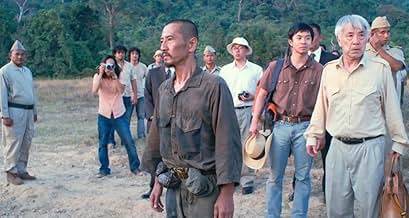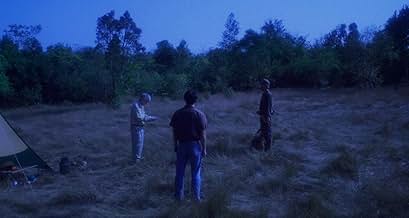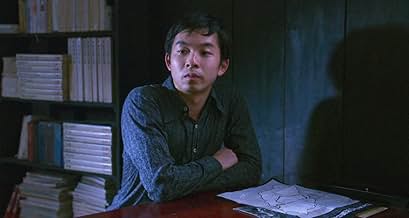IMDb-BEWERTUNG
7,2/10
3274
IHRE BEWERTUNG
Als Japan am Ende des Zweiten Weltkriegs kapituliert, zieht sich der Soldat Hiroo Onoda in den Dschungel der Philippinen zurück, um den Krieg selbst noch 10.000 Tage lang fortzusetzen.Als Japan am Ende des Zweiten Weltkriegs kapituliert, zieht sich der Soldat Hiroo Onoda in den Dschungel der Philippinen zurück, um den Krieg selbst noch 10.000 Tage lang fortzusetzen.Als Japan am Ende des Zweiten Weltkriegs kapituliert, zieht sich der Soldat Hiroo Onoda in den Dschungel der Philippinen zurück, um den Krieg selbst noch 10.000 Tage lang fortzusetzen.
- Regie
- Drehbuch
- Hauptbesetzung
- Auszeichnungen
- 5 Gewinne & 20 Nominierungen insgesamt
Yûya Endô
- Hiroo Onoda - Young
- (as Endô Yûya)
Kanji Tsuda
- Hiroo Onoda - Old
- (as Tsuda Kanji)
Yûya Matsuura
- Kinshichi Kozuka - Young
- (as Matsuura Yûya)
Tetsuya Chiba
- Kinshichi Kozuka - Old
- (as Chiba Tetsuya)
Shinsuke Kato
- Shôichi Shimada
- (as Katô Shinsuke)
Kai Inowaki
- Yûichi Akatsu
- (as Inowaki Kai)
Issei Ogata
- Major Yoshimi Taniguchi
- (as Issey Ogata)
Taiga Nakano
- Norio Suzuki - The Tourist
- (as Nakano Taïga)
Nobuhiro Suwa
- Tanejirô Onoda - Onoda's Father
- (as Suwa Nobuhiro)
Mutsuo Yoshioka
- Captain Hayakawa
- (as Yoshioka Mutsuo)
Tomomitsu Adachi
- Governor-General Shigenori Kuroda
- (as Adachi Tomomitsu)
Kyûsaku Shimada
- Lieutenant Suehiro
- (as Shimada Kyûsaku)
Jemuel Satumba
- Filipino Prisoner
- (as Jemuel Cedrick Satumba)
Ryû Morioka
- Student
- (as Ryu Morioka)
Akira Morita
- Extra
- (as Morita Akira)
Empfohlene Bewertungen
The case of Onoda, a WW2 Japanese soldier who carried on fighting for thirty years on the Philippine island of Lubang before being persuaded to give up, was a celebrated case in the mid 1970s, and I was really impressed by this dramatic reconstruction of his life. It's a high quality movie, beautifully filmed, thoughtful, and well played all round, though I also thought it a bit too long at more than 2.5 hours. There are great performances all round and solid direction which almost has a David Lean approach at times (no bad thing), so it's a 'small scale epic' with a heart, and well worth a view. There are some supremely effective moments, and the film deserves a wider audience, though you do have spare quite a bit of time.
What a good surprise this film directed by a French and speaking of the war in the Pacific from the Japanese point of view. So unexpected and awesome in the same time. I could not believe that this young director is not under the influence of Clint Eastwood's LETTERS FROM IWO JIMA, John Boorman's HELL IN THE PACIFIC or Kon Ichikawa's FIRES IN THE PLAINS. Impossible for me to think that he would have never heard of those three iconic films. Back to this one, I don't know how anyone could say harm about it, except maybe a bit too long; yes, maybe. Plus, it speaks not only of the japanese soldiers, but not the kamikaze or simple fighters, but some kind of secret section of soldiers sent into a Philippines Island. The young director from France is also aware of the Mizoguchi's influence and with the poetic lines of the Japanese spirit. Good film to be watched at any cost. Only for this incredible but so authentic story.
In anticipation of the Allied landings on the Philippine island of Lubang, the Japanese send a small squad to engage in some guerrilla warfare activities pending the reorganisation of their own troops ready to return in due course. Amongst these men is the young Lt. Hiroo Onoda. He is an idealistic young man who firmly believes in his cause and is determined to do what he can, for as long as he can. Now what we know from the outset is that his nation surrenders in 1945, one year after these troops are deployed - but nobody tells Onoda. With his small squad still patrolling the island, their team begins to fracture. Their discipline to fail. The relentless monsoon rains; disease and the activities of the locals begin to reduce their number but he is adamant that he will stay on duty for as long as it takes - even if that takes us into the 1970s. Both Yûya Endô as the younger man and Kanji Tsuda as the older one play their parts convincingly as the story, based on real facts, illustrates the tough life amidst the dense jungle where they are seemingly abandoned by their own side and left to their own, limited, devices. The story mixes the timelines so we skip from young to older, and that's quite effective at breaking up the story to avoid it being just a straightforward chronology. It also uses the other characterisations to demonstrate the increasing frustrations of these men as personalities clashed and loyalties, and authority, is tested. As we proceed their's becomes more of a brotherhood than an army unit, and that makes the tragedies and misfortunes that befall them all the more poignant. It's history, so there isn't much latitude as to the denouement, but when we do get there it's quite a touching conclusion that seems just a bit rushed, but entirely fitting.
Felt it is a bit too long in several scenes particularly early on, but watched it very smoothly due to the great story line.
Actors are all very impressive. Performance by Taiga Nakano was a relief in otherwise very serious picture.
Director Arthur Harari should deserve an admiration creating all Japanese language picture despite limited business prospect.
Ken Kai.
Actors are all very impressive. Performance by Taiga Nakano was a relief in otherwise very serious picture.
Director Arthur Harari should deserve an admiration creating all Japanese language picture despite limited business prospect.
Ken Kai.
In the closing phase of the Second World War, Imperial Japan inserts numerous specially trained soldiers throughout the Pacific islands whose secret mission is to survive at all costs and wage an unending campaign of guerrilla warfare. This film depicts the three-decade campaign of postwar "resistance" waged on Lubang Island, Philippines by Hiroo Onoda, the very last of the infamous Japanese "holdouts" who refused to accept the war had ended, against all reason and repeated attempts to make contact.
As a film, it's great - it's dramatic and engaging, with great writing, direction, and acting. But the deeper social reality is quite disturbing. Onoda and others like him are revered by many in Japan as exemplars of grit, determination, and steadfast dedication to duty, rather than as exemplars of the kind of rigid fanaticism and pathological obedience that made a continent's worth of war crimes possible.
As a film, it's great - it's dramatic and engaging, with great writing, direction, and acting. But the deeper social reality is quite disturbing. Onoda and others like him are revered by many in Japan as exemplars of grit, determination, and steadfast dedication to duty, rather than as exemplars of the kind of rigid fanaticism and pathological obedience that made a continent's worth of war crimes possible.
Wusstest du schon
- WissenswertesWhilst set on a remote Philippines Island the film was in fact shot on location in the kingdom country of Cambodia.
Top-Auswahl
Melde dich zum Bewerten an und greife auf die Watchlist für personalisierte Empfehlungen zu.
- How long is Onoda: 10,000 Nights in the Jungle?Powered by Alexa
Details
- Erscheinungsdatum
- Herkunftsländer
- Offizielle Standorte
- Sprachen
- Auch bekannt als
- Onoda: 10,000 Nights in the Jungle
- Drehorte
- Produktionsfirmen
- Weitere beteiligte Unternehmen bei IMDbPro anzeigen
Box Office
- Budget
- 4.530.000 € (geschätzt)
- Weltweiter Bruttoertrag
- 262.276 $
- Laufzeit
- 2 Std. 53 Min.(173 min)
- Farbe
- Seitenverhältnis
- 1.85 : 1
Zu dieser Seite beitragen
Bearbeitung vorschlagen oder fehlenden Inhalt hinzufügen

































